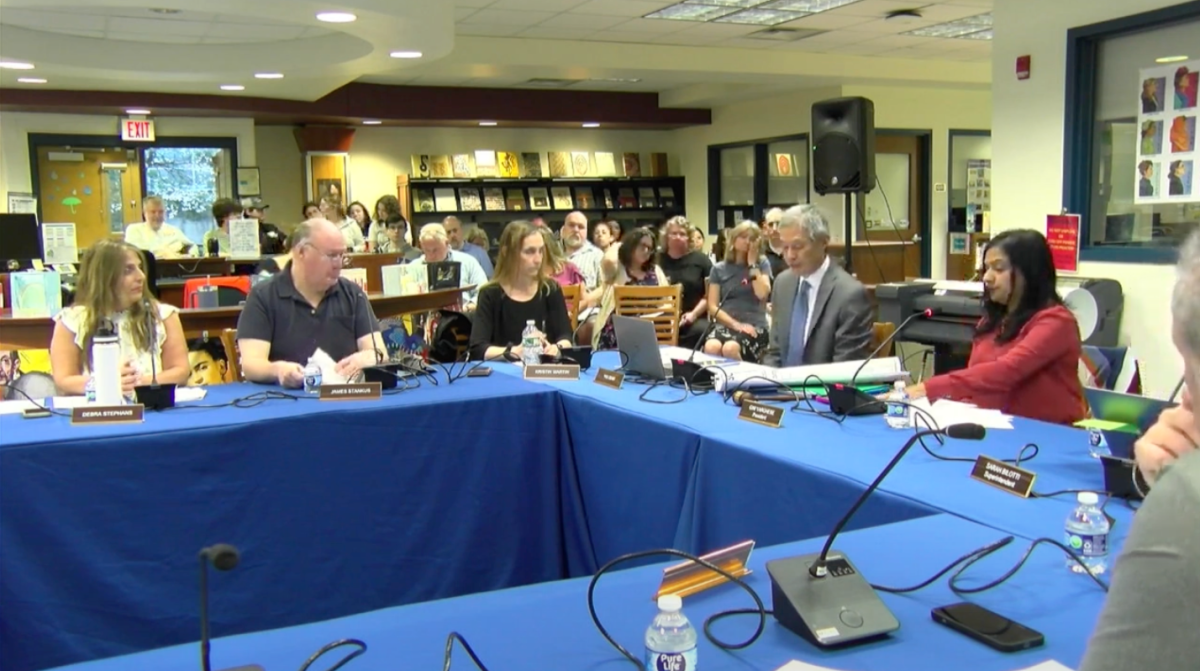On Monday night, the Pascack Valley Regional High School District Board of Education addressed comments from the public regarding the Pascack Hills music department, announced BOE member retirement, and listened to presentations.
At the start of the meeting, BOE President Gini Varghese asked for a moment of silence in honor of Pascack Valley senior Lamont Alston. On April 9, Superintendent Sarah Bilotti sent out a district-wide message announcing the tragic loss of Alston after a long battle with cancer.
Varghese also announced the resignation of Vice President Joseph Blundo due to work restraints. The Board is looking to fill the position of BOE member for River Vale. Applicants should go to the PVRHSD website and send a resume and letter of interest. Applications will close on May 14.
Business Administrator Yas Usami gave the Budget Presentation for the 2024-25 school year. He discussed student academic recognition, athletic accomplishments, curricular proposals, extracurricular proposals, and staffing. He also discussed capital projects, general fund revenues, and town taxes.
To begin, the district’s mission statement and values were outlined to support student success and a culture of innovation. A reflection of such values lies in student achievements. The Board recognized the following Hills students in the 2023-24 school year:
- 8 National Merit Commended Students
- 19 AP Scholars
- 5 AP Scholars with Honors
- 2 AP Scholars with Distinction
- 2 National African American Program
- 2 National Hispanic Recognition Program
- 1 National First Generation Program
The district used resources to excel in technology and communications with the help of interns, security, and grants. Usami recognized the following athletic teams from the spring 2023 season:
- Baseball: Group 2 State Champions
- Boys Lacrosse: Division Champions – 1st Time in School History
In 2023-24, the Hills softball field was regraded and realigned. Usami recognized the following athletic teams from the fall 2023 and winter 2024 seasons, respectively:
- Football: 2nd Straight Division Champions
- Girls Tennis: Division Champions
- Gymnastics: Division Champions
- Girls Swimming: Division Champions
- Boys Basketball: Bergen Invitational Tournament Champions & Most Valuable Player (MVP) of the Tournament, Nick Luckman
Curricular and extracurricular proposals such as enhanced scheduling, program expansions, technology updates, implementation of new required state standards for classes, professional development, “real world learning,” partnerships with universities, and club and sports accommodations were addressed.
Staffing concerns were addressed and later questioned regarding the absorption of positions, enrollment decrease, and future scheduling changes. Budgeting also changed due to capital projects such as air conditioning, field lighting, and Direct Digital Control (DDC) systems.
Sources of revenue were assessed according to funding, tuition, taxes, emergency reserves, and more. With regard to budget expenditures, Usami was asked about the use of the emergency reserve and whether the district has had to use it before in his time as Business Administrator.
“Yes, this is the first time we’ve used it,” he responded
BOE student representative Olivia Ge gave her monthly report. She discussed a trip to SpyScape Museum, a student-led dog bed project, Echoes Literary Magazine Columbia Scholastic Press Association Silver Crown Award, Pascack Hills History Club Podcast, the Pascack Player’s production of “Cinderella,” and the National Honor Society (NHS) induction ceremony.
For athletic items, Ge discussed the boys tennis team’s undefeated season in the Big North Patriot Division and the girls lacrosse team’s trip to Universal Studios in Florida.
Varghese congratulated the Pascack Pi-oneers on their trip to Houston, Texas for FIRST Robotics Competition (FRC) Championships. Bilotti also wished DECA good luck with their competition in Anaheim, Cali.
Regarding the music departments at both Pascack Hills and Pascack Valley, Bilotti clarified the staffing cuts mentioned in the Budget Presentation. She discussed budgetary absorptions upon recent resignations, music interest outreach, and music teacher position recognition and clarifications.
“Part of what we’re grappling with is small numbers of students selecting those courses,” she said.
Bilotti discussed ways that teachers are gaining interest in music programs, such as the piano lounge presented by Director of Choirs Margarita Elkin.
“Our teachers are definitely working hard to try to get interest in the programs,” she said.
Bilotti also discussed other outreach opportunities, such as connecting with middle school students at football games and revamping the music curriculum as part of a five-year cycle. This could include higher-level music courses on an honors track.
“All of that is to say that we’re trying to see if there are ways that we can increase the course selections for these particular programs. We’re not making any reductions in our staffing for next year…we’re also trying to be creative about is there a way for us to get more kids involved and to make this more enticing for students,” she said
When the BOE opened to take comments from the public, several residents spoke about the music department.
Woodcliff Lake resident Antoinette McKay discussed the music department classes that may not be offered to students next year, specifically Advanced Placement (AP) Music Theory and Music Technology.
“It was wonderful hearing from the other departments, but not all kids go into math and science and social studies. There [are] a lot of kids that go into music, the arts. Pascack Hills has really fallen short on that,” McKay said.
McKay further addressed the future of music students and what they need from high school to be music majors in college. She spoke on the online music theory class, current student engagement in music, and music classes’ general necessity despite low enrollment.
“Did you know that to apply to college as a music major…you not only need to apply to the main college…you also need to apply separately to the music department and have a portfolio including performances, accolades received over your high school years,” she said,” You have to audition via video first, then, if invited, you perform in-person at each school for a panel of professors. I ask you, how many other students have to do this for other majors that they would be going for?”
Woodcliff Lake resident and Music Parents Association (MPA) President Rhonda Swiderski continued the sentiments of McKay. She expressed her disappointment in the BOE’s consideration of cutting two music programs. She spoke on college music programs and the importance of high school preparation.
“I think it would be a disservice to our music majors to take away [AP] Music Theory and not offer it every year. Even if you just offer the intro a little bit earlier and then an AP, I think it would really help children who are going out there. I want you to keep them in your mind and in your thoughts,” she said.
Swiderski addressed the challenges that her son, a senior at Hills, faced due to a lack of college preparation programs for music students.
“I had my son work with a music tutor, but in actuality, I don’t think I should have had to. Many high schools, including the one that I work at, offer programs, whether it be during the school year or over the summer, like a portfolio prep or a music audition prep. I don’t think Hills offers anything like that, which puts our kids at a disadvantage,” she said.
Hills senior Derek Geier discussed his experience as a student at Hills and pursuing music in college. He addressed the danger of having a bi-yearly AP Music Theory class, as it would discourage passionate or potential musicians from pursuing music. He also raised concerns about a lack of awareness of these courses.
“If you ask any randomly selected student at this school about an AP Music Theory class, they likely will have no idea what you’re even talking about, especially those in the freshman class. If these classes are only offered bi-yearly, I doubt that this will somehow raise awareness of the courses to the average incoming students and may even discourage enrollment for many, as only being available once every two years may cause people to perceive it as a non-important class” he said.
Geier stated that other departments have varying courses and electives offered to students, including Literature of the Holocaust and Language, Myth, & Culture. He argued that AP Music Theory and Music Technology are the same specializations.
“It feels unfair that the Board finds it acceptable to potentially discourage any musically talented students who may want to pursue those specialized and unique electives that are in the music department,” he said.
Hills sophomore Michael McKay agreed with the necessity of Music Theory and that the BOE must recognize music’s role in college, jobs, and student lives.
“You’re going to need Music Theory to audition, you need it for when you’re in the classes, you need it for when you want to succeed in this field. When you audition for the music department, it is a whole other process besides just getting into the school,” he said.
McKay discussed his conversations with college professors, who also emphasized the importance of music classes in high school.
“Over this past spring break, I have talked to four college music departments, including the University of Florida and Florida State University, where they have all unanimously said that I should take Music Theory now so I am better prepared for when I am in the classes. Also, it benefits me as a music student, where I can do better in some of my required music classes in college and not fall behind,” he said.
Woodcliff Lake resident Phil Lenger added to the sentiments of the other comments.
“You’re dealing with a lot of passionate musicians, artists, and it’s no surprise that they’re gonna get passionate about this situation,” he said.
Lenger specifically raised concerns about the emphasis that the district places on athletic programs versus music programs.
“This school obviously puts a lot of value in turning out great athletes. I think that’s great and there’s a lot of value and probably a lot of support in the community for that…What I would actually question is, do we want to send the message that we are putting all our eggs in the athletic basket, or do we want to be more diversified with our offerings?” he said.
Montvale resident James Geier expressed his surprise and concern at the drop in music course enrollment.
“Just hearing the presentations tonight, and there [were] a lot of them, but there was a lot of good information, I was quite surprised to see enrollment going down so much over the last five years for Pascack Hills and Pascack Valley,” he said.
Geier discussed students from the district attending other schools due to a lack of programs at Hills. He emphasized the need for further engagement and the importance of upper-level music courses for aspiring music majors.
“As you consider what you want to do with music, please take that into consideration for those students that want to go onto that field,” he said.
Hills senior Lily Plechner gave her perspective on the music department as a non-music major. She credited her involvement in the music department as a great asset to her college application process. She also spoke on the Social and Emotional Learning (SEL) impact the department has had on her high school experience.
“I also know that social-emotional well-being is a key value at Hills and the music department provides that for many. Personally, band has been a way to destress from academics and has given me a family, and I know that many other students within the music department feel the same way,” she said.
Plechner questioned what this decision could mean for the future of the music department.
“I know this doesn’t necessarily pertain to the possibility of cutting music classes, but if we do cut Music Tech and Music Theory, what will come next for the music department and even other arts-related classes? I wanted to emphasize the importance of the music department being given the proper resources, as many other departments are,” she said.
In an interview with the Trailblazer following the BOE meeting, Hills senior Brendan Swiderski commented on the importance of music programs.
“For people who are going into college for music, these programs are vital and they are required,” he said.
Michael McKay continued the sentiments of Swiderski, raising concerns about what this decision could mean for other music extracurriculars and programs.
“They are starting to cut music classes, but if you look at the arts, we have a theater program but it’s not a class. What’s to say that can’t go next? It makes me question what they will start cutting next and why there is low enrollment. Have you thought of talking to the students, seeing what they like and don’t like?” he said.
Derek Geier added to his statement from the meeting, claiming that students have a different set of needs than the district.
“I do think it comes down to the fact that the music department isn’t necessarily organized…with a lot of the departments, you have a whole group of people. The music department basically is Elkin and Dore here. I think there is a very strong disconnect between understanding that ticking off the numbers of a box for your numbers of students isn’t always going to be the way to increase how well your school is doing,” he said.
Regarding agenda and non-agenda items, Hillsdale resident Michael Fox discussed final and midterm reports at Pascack Valley.
Earlier in the meeting, Matthew Smelcer from the SAI Group presented a Cell Coverage Analysis of Pascack Valley following concerns raised by district residents and BOE members.
District Supervisor of Math and Computer Science Mark Russo, District Supervisor of Science and Technology Education Megan Graziano, and Director of Curriculum, Instruction, and Assessment Barry Bachenheimer gave a presentation on Departmental Highlights for Math and Science.
Russo discussed new programs such as Python for computer science, test results as a reflection of student comprehension, instruction methods, and new class support for students.
Graziano highlighted the Terra North Jersey STEM Fair. 10 students from PVRHSD won awards, including two first-place wins from Hills. Excitingly, Hills and Valley were also both awarded the International Technology and Engineering Educators Association (ITEEA).
Graziano discussed Laerdal Resource applications in class, community service partnerships, professional development efforts, and activity brainstorms. She also discussed upcoming science center availability to students.
At the end of the meeting, the Science and Math department supervisors were asked questions about their goals and how they plan to implement their mission. Varghese asked about the math centers at Hills and Valley. Russo responded by saying there is a consistent number of students attending.
“We have a math center in both buildings during lunch three days a week and depending on the ebb and flow of the year, it can be overutilized, but there are consistently students in the math center in both buildings,” he responded.
Russo and Graziano went into classrooms to talk with students about midterms. Their responses helped influence the final exam schedule for 2024, which will include a feedback day.
“I really appreciate everything that you all do and I appreciate hearing what you have to say…I think with this relatively newer sort of Board, I think that we should aim for the stars,” said BOE President Varghese.
For a full viewing of the BOE meeting, click the link below.













































